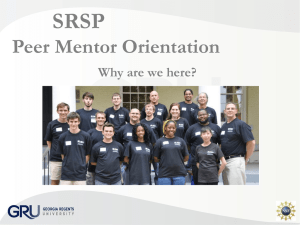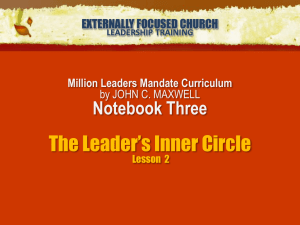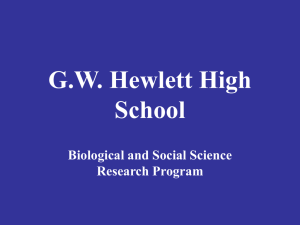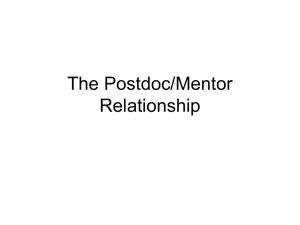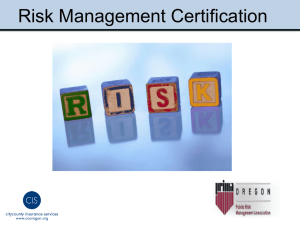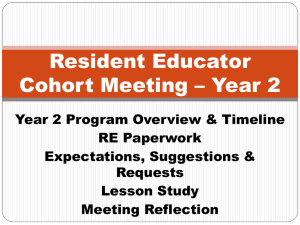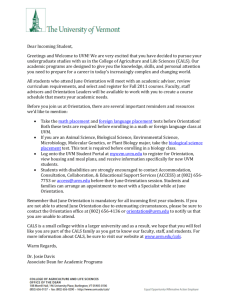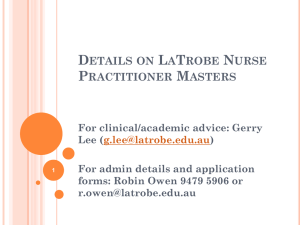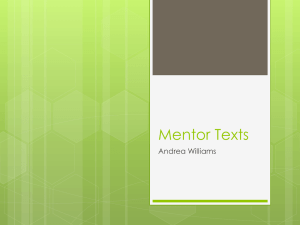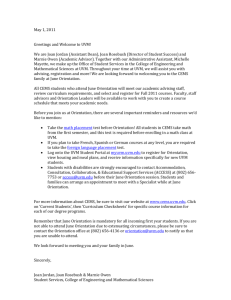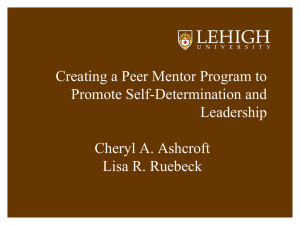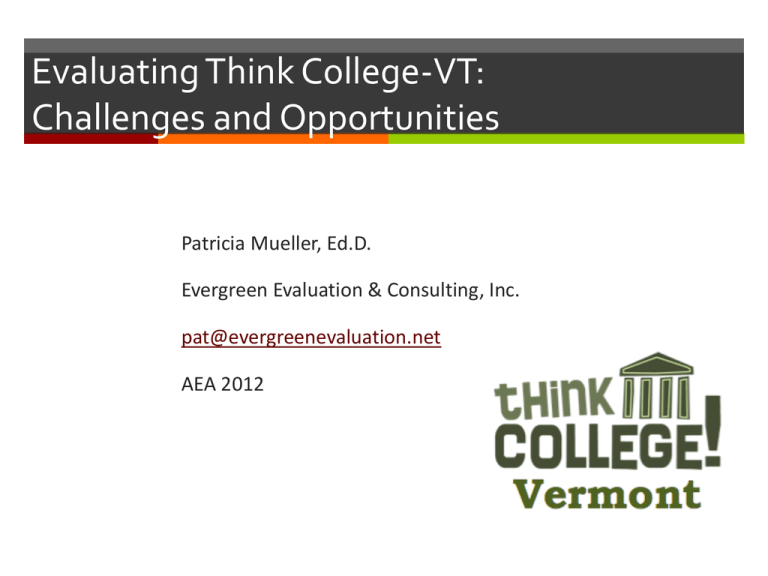
Evaluating Think College-VT:
Challenges and Opportunities
Patricia Mueller, Ed.D.
Evergreen Evaluation & Consulting, Inc.
pat@evergreenevaluation.net
AEA 2012
What is Think College?
Transition and Postsecondary Programs for
Students with Intellectual Disabilities (TPSID)
USDOE, Office of Post Secondary Education
October 2010: 27 grants awarded nationally
($10.5 million)
23 states represented
National Coordinating Center: U Mass, Boston
DREAMS
“As a person with a
disability I always
dreamed about going
to college or a big
University. Think
College gave me the
opportunity to fulfill
my dreams at UVM.”
Think College-VT Highlights
Certificate Program
Mentor Support
Financial Guidance
Sub-award to Johnson State
College
Partnerships: Self-Advocates,
Vocational Rehabilitation, Local
Education & Mental Health
Agencies
Program Focus Areas
Fully inclusive Higher Education for students
with cognitive disabilities
Academic
Social/Recreational
Independent Living
& Self-Advocacy
Skills
Integrated Work
Experience & Career
Skills
Academics
Course credits earned
Tuition based
Course selection based on
interests & potential career
choices
Written Expression, Child
Development, US History, Farm
to Table, Digital Media, etc.
Faculty Consultation (Universal
Design for Learning)
©2009 Sally McCay All Rights Reserved
Social/Recreational
UVM Student Center
•
•
•
Fitness Center
•
•
•
•
Pool, Foosball
Lounge
Dining
Swimming Pool
Tennis
Racquetball
Zumba/Yoga
Burlington 101
Independent Living & Self-Advocacy
No Residential Option
Individualized & Experiential
Budgeting
Health & Nutrition
Communication
Organization
Dress to Impress
Transportation
Integrated Work & Career Skills
Exploration
•
•
•
Interest Inventories
Job Shadowing
Job Fairs
Planning
•
•
•
Resume Writing
Linked-In Account
Portfolio
Experience
•
•
•
Internship
Resume Building
Employability Skills
Connections
•
•
•
DVR Case/Counselor
Community Rehab.
Program
Career-Focused Job
Career Exploration & Internships
Technology & Social Media
iPads
Drop-Box (shared folders)
Cell phones
Schedules/Calendars
Facebook, blogs, Twitter
Evaluating the Program
Logic Model
Inputs
Outputs
Outcomes
Articulated Performance Outcomes: Short,
Intermediate, Long Term
Alignment with Program (GPRA) Measures, TPSID
Standards, Quality Indicators, Benchmarks
Evaluation Plan
5 Objectives with Performance Measures (Process &
Outcome)
Evaluation Questions
Data Sources
Methods/Analysis
Party Responsible
Timeline
Program/Competitive Priority Alignment
Parent & Support Staff Survey Results
High level of satisfaction with…
• application process
• coursework
• support to students
Actionable Recommendations
• additional information on financial support
• more natural social interaction
• mini-tutorials for academic support
• improved communication among team
members
Parent Quote
“The entire experience for [us] has
been incredible…It’s a terrific program
that now needs university support and
support from secondary schools to
feed the program with great students.”
UVM Peer Mentors
Mentor Survey Results
100% agreement that the Program…
• provides adequate training and supervision
• is well-organized and of high quality
Actionable Recommendations
• offer residential options
• allow for free time on campus/increased
social opportunities
• have a substitute mentor pool
• improved communication among team
members
Mentor Quote
“This is the best job that I’ve ever had…
A program that allows people with intellectual
disabilities to pursue higher education feels so right!
Being a mentor has made me think about my personal
and professional life goals in a way that past academic
and job experiences haven’t.
Our students are AMAZING!”
Student Interviews
All students reported high satisfaction with “being
in college.”
Positive comments about…
• mentor & faculty support
• meeting new friends
• increasing skills
Actionable Recommendations
• increase on campus activities
• residential option
• adjust course load/work
Faculty Interviews
Benefits & Challenges to…
Faculty
TC student
Mentors
Other students in the class
Overall impressions, additional supports and
recommendations
Actionable Recommendations
Increase marketing
Ensure faculty understand the concept of
“inclusion”
Improve match of student with class
Improve logistics re: student placement & grading
Clarify roles & communication
Continue to provide support re: UDL principles
Evaluation Impact to Date
Increased check-ins with faculty; ongoing
communication; clarification of roles
Monitoring number of students with ID in 1 class
Documenting how to earn the Certificate
Use of technology & social media has increased
social interactions (e.g., participation in clubs)
Evaluation Impact to Date
More free time available for students to increase
independence
Mentors are learning when to “back off”
Cloud-based individual student folders to increase
communication/accessibility
Increased opportunities for career exploration
Evaluation Opportunities
Chance to talk with end-users
Management Team is “evaluation savvy”
Evaluation data is USED for Program
improvement…yahoo!
Ability to triangulate the data
Ability to work in home state
Recommendations ARE actionable!
Evaluation Challenges
Need evaluator with expertise/comfort with
the population
Comfort level of the TC students with the
evaluator
Scheduling challenges with all interviewees
Limited budget for on-site observation;
more in-depth methodologies
Multi-site program = tailoring instruments
Contact Information
Pat Mueller, Think College-VT Evaluator (802 434-5607)
pat@evergreenevaluation.net;
www.evergreenevaluation.net
Think College Vermont (802 656-1126)
www.uvm.edu/~cdci/thinkcollege/
Think College National Site
www.thinkcollege.net

